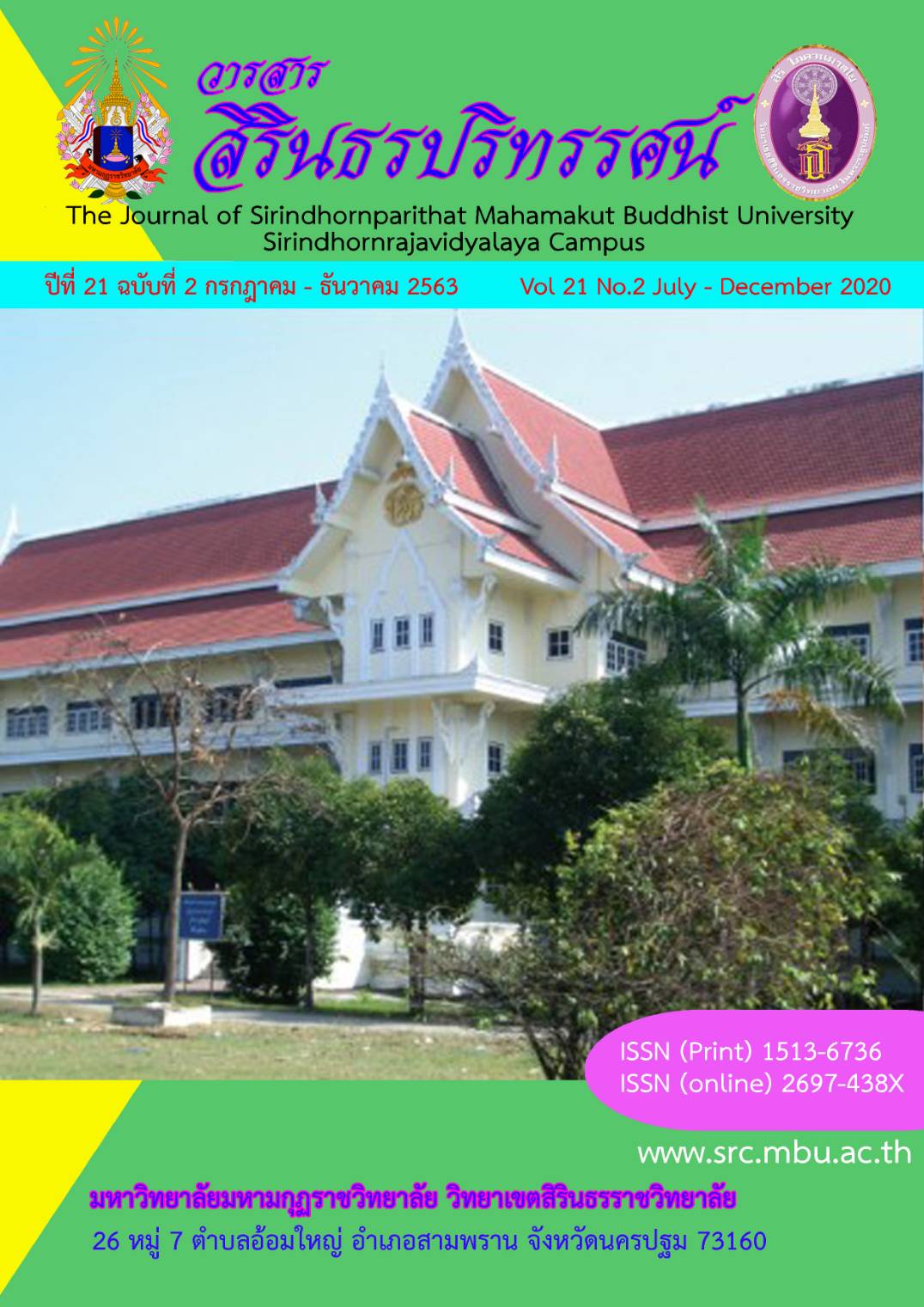Self-Development in Accordance with Buddhist Principles
Keywords:
Buddhism, spiritual development, morality, wisdomAbstract
The purposes of this article were to study the Buddhist principles for self-development in terms of behavioral and moral development, wisdom development, and spiritual and emotional development. The results of the study showed that human behavior is influenced by internal factors which are his or her mind and innate characteristic, and external factors which are the ways he or she is educated and trained, association with friends, and surrounding environments. Buddhism teaches human beings to practice morality in order to purify physical and verbal behavior to be free from sin and evil-doing. Buddhism teaches human beings to develop wisdom through education, contemplation with consciousness, and meditation practice. It also teaches human beings about spiritual development in order to improve the mind to be peaceful, happy, stable, and unmoved by worldly matters. The results of development based on Buddhism will lead to appropriate and acceptable behavior and etiquette as well as good conduct with loving-kindness, compassion, and generosity. Additionally, practicing Buddhist principles can give practitioners a peaceful mind that is free from selfishness, greed, hatred, delusion, and revenge, which will lead to creating peace and happiness for practitioners themselves and society at large.
References
มหาจุฬาลงกรณราชวิทยาลัย. (2539). พระไตรปิฎกภาษาไทย ฉบับมหาจุฬาลงกรณราชวิทยาลัย. กรุงเทพฯ: โรงพิมพ์มหาจุฬาลงกรณราชวิทยาลัย.
มหามกุฎราชวิทยาลัย. (2536). พระไตรปิฎกและอรรถกถา แปล ชุด 91 เล่ม. พิมพ์ครั้งที่ 3. กรุงเทพฯ: สำนักพิมพ์มหามกุฏราชวิทยาลัย.
มหามกุฎราชวิทยาลัย (2525). พระไตรปิฎกขุททกนิกาย ธรรมบท เล่มที่ 25 ฉบับมหาวิทยาลัยมหามกุฎราชวิทยาลัย. กรุงเทพฯ : สำนักพิมพ์มหามกุฎราชวิทยาลัย.
พระธรรมปิฎก (ประยุทธ์ ปยุตฺโต). (2540). พระพุทธศาสนาในอาเซีย. กรุงเทพฯ : ธรรมสภา.
พระพรหมคุณาภรณ์ (ป.อ.ปยุตฺโต). (2553). กาลานุกรม พระพุทธศาสนาในอารยธรรมโลก. กรุงเทพฯ : สำนักพิมพ์ผลิธัมม์.
พระพรหมคุณาภรณ์ (ป.อ.ปยุตฺโต) (2555). ธรรมนูญชีวิต. กรุงเทพฯ: บริษัท อกาลิโก พับลิชชิง จำกัด
สมเด็จพระมหาวีรวงศ์ (พิมพ์ ธมฺมธรเถร). (2548). สากลศาสนา. กรุงเทพฯ : สำนักพิมพ์มหามกุฏราชวิทยาลัย.
สุขุมพงษ์ ชาญนุวงศ์. (2555). นี้แหละ....คือสิ่งที่พระพุทธเจ้าสอนให้ไอน์สไตน์ฉลาดและมีความสุข. กรุงเทพฯ: สำนักพิมพ์ธิงค์ บิยอนด์.
สุทธิลักษณ์ สมิตะสิริ และประภา คงปัญญา. (2553). ความสุข ชุมชน และวิถี: เรื่องราวจากพุทธมณฑล. นครปฐม: ศูนย์จิตตปัญญาศึกษา มหาวิทยาลัยมหิดล.
Channuwong, S., Ruksat, S., & Ploychum, S. (2018). “An integration of Buddhist teachings in stress management”. Journal of Community Development Research, 11(4), 148-158.
Dalai Lama, H.H. (2001). An open heart: Practicing compassion in everyday life. New York: Time Warner Trade.
Dominique, Side. (2002). The spirit of peace: His Holiness the Dalai Lama. Hammersmith, London: An Imprint of HarperCollins Publishers.
Kaviratna, H. (1980). Dhammapada: Wisdom of the Buddha. Pasadena, California, USA: Theosophical University Press.
Marcus, B. (2002). The parallel sayings: Jesus & Buddha. Berkeley, CA: Sea stone.
Mills, R., & Spittle, E. (2003). The wisdom within. Renton, WA: Lone Pine Publishing.
Turner, L. (2002). A guide to meditation. London: Paragon Publishing.
Wallace, B.A. (2007). Contemplative science. Columbia University Press.
Downloads
Published
Issue
Section
License
บทความที่ได้รับการตีพิมพ์เป็นลิขสิทธิ์ของ มหาวิทยาลัยมหามกุฏราชวิทยาลัย วิทยาเขตสิรินธรราชวิทยาลัย
ข้อความที่ปรากฏในบทความแต่ละเรื่องในวารสารวิชาการเล่มนี้เป็นความคิดเห็นส่วนตัวของผู้เขียนแต่ละท่านไม่เกี่ยวข้องกับหาวิทยาลัยมหามกุฏราชวิทยาลัย วิทยาเขตสิรินธรราชวิทยาลัย และคณาจารย์ท่านอื่นๆในมหาวิทยาลัยฯ แต่อย่างใด ความรับผิดชอบองค์ประกอบทั้งหมดของบทความแต่ละเรื่องเป็นของผู้เขียนแต่ละท่าน หากมีความผิดพลาดใดๆ ผู้เขียนแต่ละท่านจะรับผิดชอบบทความของตนเองแต่ผู้เดียว




